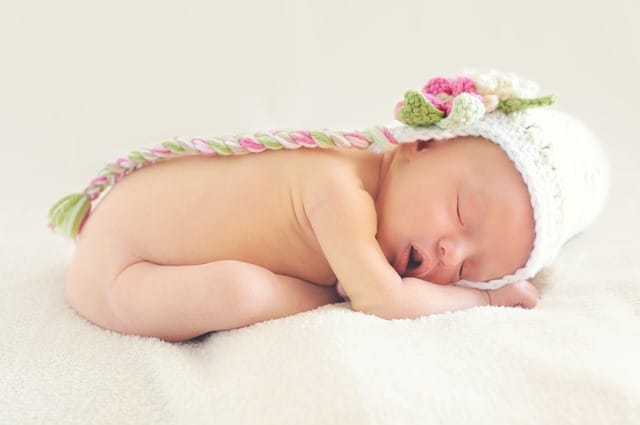Why Babies Smell So Good Unless you’ve been living under a rock or have never had the pleasure of being within sniffing distance of a new baby’s head, you already know—babies smell like pure joy. What is it about that sweet, inexplicably sweet aroma that keeps parents everywhere coming back for more?
The phenomenon of new baby smell was so pervasive that it attracted the interest of researchers who wanted to chime in. More than parental adoration is at play with the intoxicating baby smell—there’s science, biology, evolution, and culture.
Why Do Babies Smell Good? What Research Tells Us
While experts still can’t nail the exact reason, the general consensus is that a baby’s skin plays a big role. “Our best understanding is that the smell of a newborn baby comes from the oils produced by the baby’s sebaceous glands,” explains Marty Ellington Jr, MD, MPH, Chairperson of the Department of Pediatrics at Lenox Hill Hospital in New York City. Sebaceous glands are those responsible for skin oils.
Scientists say more than childbirth fluids and substances; the smell of a newborn is its own distinct scent. A 2019 study used a non-intrusive approach to capture odors from newborn babies’ heads immediately after delivery and compared this with that of the amniotic fluid. It found that although they shared the same notes, the odor coming from the head of the baby had its own signature chemical makeup.
How long does the new baby smell last?
The newborn smell disappears completely within a few weeks after birth because newborns lack vernix caseosa, a white, waxy substance that covers them at birth and contains lipids, proteins, and water. This substance is believed to be one of the main contributors to the new baby smell. It forms during the last trimester of pregnancy but starts to break down by about 35 weeks, so the baby is born with remnants.
Why We Are Drawn to the New Baby Smell
While there is some science at play here, Dr. Ellington says from an evolutionary perspective humans are pretty much hard-wired to like the way babies smell.
“Our brains and neurological systems are wired to reward us for that smell,” he says. “Being attracted to it makes us all the more protective of our offspring. This goes for the parents themselves, but other humans too. We all respond positively to newborns. It’s a very highly evolved evolutionary response.”
All these experiences of a newborn smell are also influenced by societal and cultural reasons. He continues, “People like to be close to, hold, and smell babies. There are many different aspects as to why, but as a species, we are drawn to protect young children. That’s part of it.”
The Power of the Newborn Scent
A study back in 1987 proved that moms could recognize their babies by smell alone. The study showed that 90% of women could identify their newborns by smell after only 10 minutes to an hour with them.. Though short-lived, that new baby smell is a potent one!
In fact, as one study in the journal Frontiers in Psychology explains, the smell of newborn babies is particularly positive for people with ovaries’ brains. In the study, they took 30 people with ovaries—15 just after becoming mothers, 15 who hadn’t had children—and asked them to distinguish different mystery scents, including newborn odor, while observing their brain activity.
“What we did in our study was basically investigating how new [birthing parents] would react to the body odor of a newborn,” Johannes Frasnelli, MD, one of the lead authors of the study and a postdoctoral researcher and Associate Professor at the University of Quebec at Trois-Rivieres, explained. “And I think importantly, it’s important to point out it was not their own baby, it was another baby.”. Well, what it means is that it’s not only the case for the [new parents] but also for the [non-parents]—these baby body odors activated reward circuits of the brain, and that is different from usual odors.
He tells Parents that common odors usually trigger other specific areas of the brain called olfactory processing areas—but instead, the baby odors triggered reward centers, similar to the way good food or even drugs do. “This was much stronger for the [new parents] than for the [non-parents],” he says.
These findings appear to confirm what parents have always known—that new baby smell is addicting.
Also Read : The Best Cloth Diapers That Are Actually Easy to Use
The New Baby Smell Helps Parents Bond
Says Dr. Ellington, smell is a powerful tool in emotional bonding when combined with other aspects of your little one: “The baby’s appearance, smile, smell, all the things the child does, encourages us to nurture the child,” he says. “Adults respond positively to babies. It’s all part of the bonding process.”
That sweet, comforting smell, though, loved by parents everywhere, comes from many levels of reasoning, be it from a scientific and biological to an evolutionary and psychological type. “It’s an innate response,” says Dr. Ellington. “It’s combined with actual feelings for the child, but there are societal and cultural aspects too.” That is what our biology is telling us, yet our higher level of societal functioning and processing is telling us to protect and love newborns. Here are some reasons why the new baby smell joins parents with the child.
Also Read :
Enables one to feel attached
Smell, in particular, helps develop emotions that promote nurturing. The smell of your baby—through skin-to-skin contact, for example—works to stimulate the release of oxytocin (the “love hormone”) in both the parent or caretaker and the infant. Oxytocin increases feelings of attachment, warmth, relaxation, and—more than anything else—bonding.
Effects of a positive response to infants
Dr. Frasnelli credits the pleasant response to newborn smell as an evolutionary survival mechanism, describing: “This is an important mechanism because, as we all know, newborns are actually quite annoying. They’re very disruptive to be around, and yet, for most parents it’s the most beautiful thing in the world,” he says. “So, evolution has made sure there are different mechanisms in place to [form] this attachment [to the baby].”. Body odor seems to be one of the attachment mechanisms that are in place very early on.”
The Parent’s Scent Is Important Too
Equally important is the role of smell in bonding. A study published by Science Advances in 2021 finds that babies can recognize and bond with strangers who smell like the birthing parent. In a related study, researchers caught the brain wave activity of 62 sets of birth parents and their infants using dual-electroencephalography, dual-EEG. As the new parents stroked and spoke to their babies, their brain activities synched up, mostly during face-to-face interactions.
When infants met strangers face-to-face, their brain synchrony was noticeably lower. However, placing a t-shirt containing their birthing parent’s scent nearby pushed the brain activity between babies and strangers towards a more synchronized state, similar to that with their birthing parent. Indeed, the babies were also more attentive, happier, and engaged when their parent’s odor was present.
In sum, these results support the idea that a baby exposed to birth parent odor feels more secure, comfortable, and socially responsive.
Key Takeaway
Why do babies smell so good? If we take it from a scientific basis, a baby smells of vernix caseosa, which covers its skin, plus some biological individuality of body chemistry. Skin-to-skin contact may stimulate the release of oxytocin from smelling a baby, often referred to as the “love hormone.” It tends to cause comfort and promote bonding among families; moreover, it relieves stress. It’s genetic to smell the baby in order to take good care of him/her and protect him/her.










